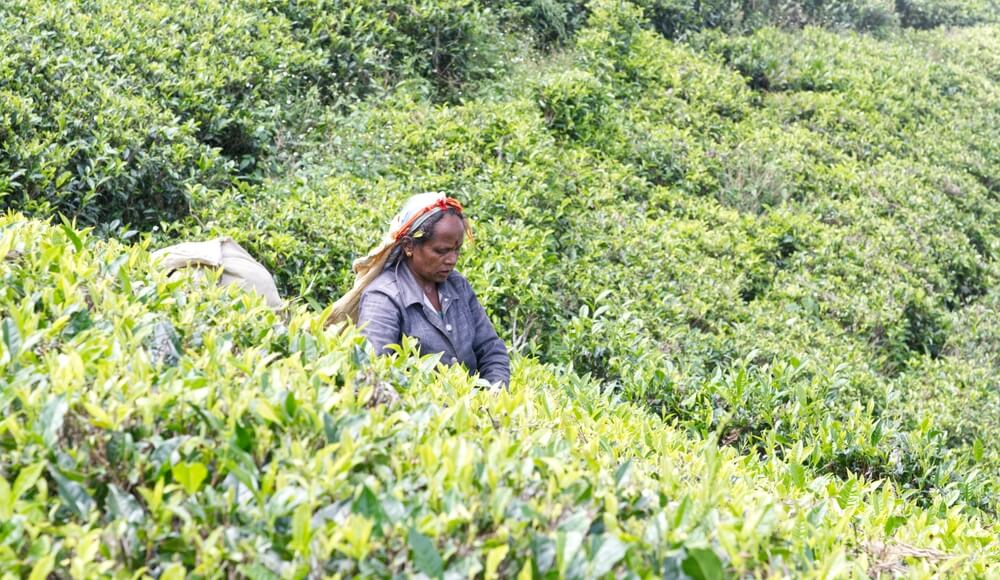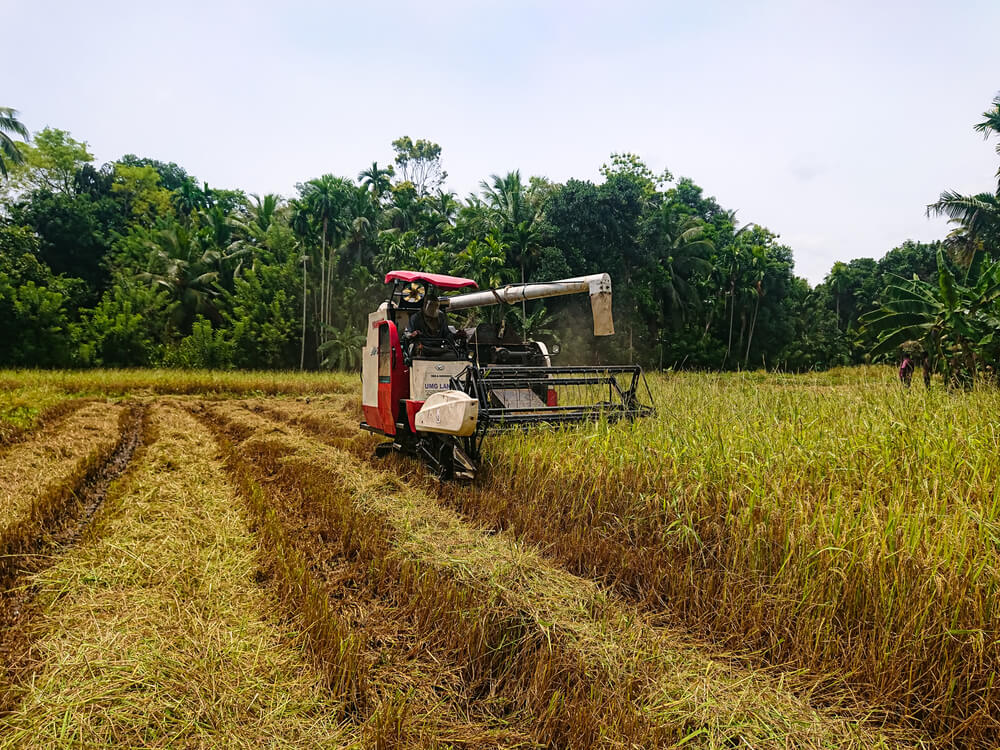Sri Lanka’s Organic Experiment Went Very, Very Wrong
Last year, the country implemented a countrywide ban on agrochemicals and fertilizers. It backfired—big time.
Sri Lanka’s Organic Experiment Went Very, Very Wrong
Last year, the country implemented a countrywide ban on agrochemicals and fertilizers. It backfired—big time.

Farmworkers on a tea estate in Sri Lanka in December 2021.by Dr. Malala Rajapaksha, Shutterstock.
Last spring, Sri Lanka’s President Gotabaya Rajapaksa put a ban on agrochemicals. His goal was an ambitious one: to transform Sri Lanka into the first nation with 100-percent organic agriculture. Less than a year later, the country is left in an economic and supply shortage crisis as a result.
The transition to fully organic agriculture was a pillar of Gotabaya’s 2019 campaign, during which he proposed the move be phased out over a 10-year period. Just a few months after his election, the COVID-19 pandemic rocked the world. That didn’t stop Gotabaya from implementing a complete ban on the importation and use of synthetic fertilizers and pesticides on April 26, 2021. What was intended to be a positive move ahead for Sri Lanka’s nearly two million farmers soon backfired.
The consequences of the decision were apparent quickly. Al Jazeera reported that nearly a third of all agricultural land in the country remained dormant due to the ban.
Within six months of the ban, rice production in the country—a once very sufficient industry—dropped 20 percent, forcing Sri Lanka to import $450 million of rice to meet supply needs and surging rice prices rose nearly 50 percent.
Now, Sri Lanka will pay farmers across the country 40,000 million rupees ($200 million) to compensate for their barren harvests and crop failures. In addition to the funding, the Sri Lankan government will pay $149 million in price subsidies to rice farmers impacted by the loss.

But Sri Lanka’s farmers who accrued huge debts and crop failures say the repayment is insufficient. The hit to the tea industry alone—Sri Lanka’s main export and source of foreign exchange—is estimated to have amounted to an economic loss of $425 million.
The ripple effect of the ban impacted the entire country. According to Foreign Policy, after the ban and the pandemic, nearly half a million Sri Lankans have sunken below the poverty line.
Sri Lanka’s economic crisis—triggered by COVID-19 tourism closures and compounded by the agriculture industry collapse—has caused severe food shortages and even blackouts. As its first move in response to tea production crumbling and economic issues, the government partially lifted the agrochemical ban in November 2021—allowing the use of some non-organic farming practices while producing tea, coconut and rubber. Now, the country has entirely lifted the ban, but commercial banks lack foreign exchange to support importers trying to replenish the stock they went through during the ban.
In a 2021 USDA report concerning the country’s switch to only organic practices, the agency predicted “the lack of organic fertilizer productive capacity, coupled with the absence of a formalized plan to import organic fertilizers in lieu of chemical fertilizers, raises the potential for an adverse impact on food security.” And that’s precisely what happened.
Follow us

This work is licensed under a Creative Commons Attribution-NoDerivatives 4.0 International License.
Want to republish a Modern Farmer story?
We are happy for Modern Farmer stories to be shared, and encourage you to republish our articles for your audience. When doing so, we ask that you follow these guidelines:
Please credit us and our writers
For the author byline, please use “Author Name, Modern Farmer.” At the top of our stories, if on the web, please include this text and link: “This story was originally published by Modern Farmer.”
Please make sure to include a link back to either our home page or the article URL.
At the bottom of the story, please include the following text:
“Modern Farmer is a nonprofit initiative dedicated to raising awareness and catalyzing action at the intersection of food, agriculture, and society. Read more at <link>Modern Farmer</link>.”
Use our widget
We’d like to be able to track our stories, so we ask that if you republish our content, you do so using our widget (located on the left hand side of the article). The HTML code has a built-in tracker that tells us the data and domain where the story was published, as well as view counts.
Check the image requirements
It’s your responsibility to confirm you're licensed to republish images in our articles. Some images, such as those from commercial providers, don't allow their images to be republished without permission or payment. Copyright terms are generally listed in the image caption and attribution. You are welcome to omit our images or substitute with your own. Charts and interactive graphics follow the same rules.
Don’t change too much. Or, ask us first.
Articles must be republished in their entirety. It’s okay to change references to time (“today” to “yesterday”) or location (“Iowa City, IA” to “here”). But please keep everything else the same.
If you feel strongly that a more material edit needs to be made, get in touch with us at [email protected]. We’re happy to discuss it with the original author, but we must have prior approval for changes before publication.
Special cases
Extracts. You may run the first few lines or paragraphs of the article and then say: “Read the full article at Modern Farmer” with a link back to the original article.
Quotes. You may quote authors provided you include a link back to the article URL.
Translations. These require writer approval. To inquire about translation of a Modern Farmer article, contact us at [email protected]
Signed consent / copyright release forms. These are not required, provided you are following these guidelines.
Print. Articles can be republished in print under these same rules, with the exception that you do not need to include the links.
Tag us
When sharing the story on social media, please tag us using the following: - Twitter (@ModFarm) - Facebook (@ModernFarmerMedia) - Instagram (@modfarm)
Use our content respectfully
Modern Farmer is a nonprofit and as such we share our content for free and in good faith in order to reach new audiences. Respectfully,
No selling ads against our stories. It’s okay to put our stories on pages with ads.
Don’t republish our material wholesale, or automatically; you need to select stories to be republished individually.
You have no rights to sell, license, syndicate, or otherwise represent yourself as the authorized owner of our material to any third parties. This means that you cannot actively publish or submit our work for syndication to third party platforms or apps like Apple News or Google News. We understand that publishers cannot fully control when certain third parties automatically summarize or crawl content from publishers’ own sites.
Keep in touch
We want to hear from you if you love Modern Farmer content, have a collaboration idea, or anything else to share. As a nonprofit outlet, we work in service of our community and are always open to comments, feedback, and ideas. Contact us at [email protected].by Shea Swenson, Modern Farmer
March 26, 2022
Modern Farmer Weekly
Solutions Hub
Innovations, ideas and inspiration. Actionable solutions for a resilient food system.
ExploreExplore other topics
Share With Us
We want to hear from Modern Farmer readers who have thoughtful commentary, actionable solutions, or helpful ideas to share.
SubmitNecessary cookies are absolutely essential for the website to function properly. This category only includes cookies that ensures basic functionalities and security features of the website. These cookies do not store any personal information.
Any cookies that may not be particularly necessary for the website to function and are used specifically to collect user personal data via analytics, ads, other embedded contents are termed as non-necessary cookies.
All of the highest voted comments to this article are by arm-chair experts spouting sermons about soil amendments and bacteria and government corruption. Those are, at best, marginal concerns. The primary problem is that yields are down by half. Not a single commenter re-evaluated their opinion (or expressed any doubt) about the viability of large-scale organic farming based on the Sri Lankan experience. What will it take to convince you that N-P-K fertilizers are needed to maintain the yields that allow 8 billion humans to live on this planet? We are currently staring down the barrel of a world-wide famine… Read more »
It will be sad if this becomes an anti-organic case study. This is not a failure of organics, it is a failure of simple planning.
Soil is devoid of good bacteria from the use of the chemicals for so long. Soil would need remediation first or along the way while evolving.
!!! The Rajapaksa Sri Lankan government is VERY corrupt – they bought this “organic” plan by banning fertilisers, to *purposefully* reduce crops and drive all poor farmers out of family businesses. The government would then sell this purposefully barren land to foreigners, who would then implement mass INORGANIC production and have these poor family farmers be their worker bees/ slaves, basically out of sheer desperation. Now these farmers are fighting to get this land back. Please take the time to understand the political and cultural complexities behind something as wholesome as “organic farming”.
This article should go into detail as to what methods they used when farming. Did they use organic soil ammendments, etc? How do we know if it was the lack of chemical fertilizers that caused the decreases in production? I would appreciate a follow up with more detail. The world can learn from this and help to implement better methods as agriculture shifts from conventional farming methods.
Whoops, confusing typo. It says “imposters” where it should say “importers.”
Who advised the srilankan authorities…. May be not learned…
You’re so awesome! I don’t believe I have read a single thing like that before. So great to find someone with some original thoughts on this topic. Really.. thank you for starting this up. This website is something that is needed on the internet, someone with a little originality!
What a tragedy for the farmers and their food production system as a whole. I hope they are able to keep the spirit of trying to transition away from petroleum-based agricultural chemicals, while incorporating sustainable practices as a transitional process. “Going organic” will be a process where reliance on ecologically-unsustainable inputs is transitioned into a reliance on sustainable inputs. This transition is as inevitable for our species, as the fossil fuels upon which our global population rests is inherently unsustainable, both in quantity and in ecological costs. The reliance is still there when “going organic”, as agricultural inputs are still… Read more »
As Lincoln said “Sharpen your Axe 🪓 before you go cutting down the tree”
They reap what they sow LoL